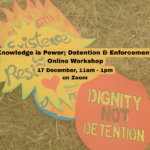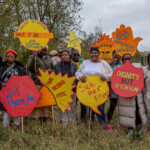
The recent poll that showed that more than 30% of British people polled were proud of the British Empire was disturbing but not entirely unsurprising news. Britain has spectacularly failed to think through, educate and memorialise its past violence and its legacy.
That is particularly evident in the widespread refusal to acknowledge the racist nature of current immigration control and its roots in Britain’s colonial past.
As Nadine El-Enany writes in the article accompanying her new book, (B)ordering Britain:
“… Britain’s borders, articulated and policed via immigration laws, maintain the global racial order established by colonialism, whereby colonised peoples are dispossessed of land and resources. They also maintain Britain as a racially and colonially configured space in which the racialised poor are subject to the operation of internal borders and are disproportionately vulnerable to street and state racial terror. Britain is thus not only bordered, but also racially and colonially ordered, through the operation of immigration control.”
Maya Goodfellow examines this in her excellent book Hostile Environment, describing how worries about immigration as “legitimate concerns” based solely on economic concerns, or the pace of cultural change, fails to acknowledge the role of racism. This separation of categories, immigration and racism, is harder to maintain when you examine further examples of public attitudes, such as the polling that showed just 10% of a 2017 sample said that no Australians should be allowed to come and live in Britain compared to 37% saying that no Nigerians should be allowed.
The need to be more explicit about the racism that forms the backbone of the UK’s immigration controls applies to those of us working to challenge that system, also. As Gemma Lousley of Women for Refugee Women wrote last year,
“To abolish immigration detention, we need to talk about its racism”.
Gemma’s article challenged those working in the NGO and charity campaigning sector to refrain from silencing the truth that upholds immigration detention: racism. This resonated with our own internal discussions at Right to Remain, and further solidified our need to for a more explicitly anti-racist focus.
Squaring up to racism and speaking its name goes beyond a critique of government policy and its impact. As NEON’s Hostile Environment Movement Study from last year pointed out, “there was … broad agreement [among interviewees] that the movement has an endemic problem with racism and white supremacy culture in relation to leadership, in which wealthy white people speak on behalf of people of colour and refuse to engage with the problematics of this in any meaningful way.”
There is a clear and urgent need for the sector, our movements to be honest about the multiple forms racism can take. We function within an inherently racist society. Therefore, our organisations, our movement will not emerge unscathed.
To tackle the racism that defines immigration control, we need to ensure that our commitment to anti-racism in our own practice is of equal priority. For example, while the Right to Remain Management Committee is diverse, with most members coming from a migrant background, the day-to-day, public-facing work is currently carried out by a predominantly white staff team, sitting amid a predominantly white-led sector. With that, gaps in knowledge, thinking and experience are likely and must be addressed when those we work to support are more often communities subject to racialised inequalities that do not stop at immigration controls alone.
We work hard to centre “lived experience” in our campaigning, but are unable to value that experience financially due to legal constraints (almost all people seeking asylum, and other undocumented migrants, are unable to work legally in the UK). This means inequity across immigration status (and therefore race) exists within our work, and we have discussed with the campaigners we work with about the best ways to value and respect their labour. We encourage allies to stand in solidarity, act with, and sometimes lead action on behalf of those impacted, but must take more of a role in disseminating the anti-racist ideals we stand by across that growing network. We recognise it is not simple, that it is a process.
To date, our conversations and implementations have taken a number of forms, starting by having time as a team to examine our own relationships with and understandings of race and racism. We will be looking to receive relevant training from anti-racism experts and have staff time designated to anti-racism as a key conversation in our work, ensuring actions are being fulfilled and learning is continual. We have put our policies on the table to consider their gaps and barriers, from recruitment to expectations of team members, and we are working on guidance that can be given to volunteers, staff and trustees to ensure our anti-racist approach is clear and accountable.
We write this to make our commitment clear: we have a lot of work to do, we must be more active in embedding our anti-racist approach, and honest in examining where we must improve. The Covid-19 crisis is not a time to de-prioritise this approach. As #CharitySoWhite highlighted in their important position paper, coronavirus is disproportionately affecting BAME communities and this isn’t about “choosing between tackling racial injustice and mitigating the impact of COVID-19. The sector should respond with an intersectional approach, taking racial injustices in our society into account, in order to be effective.”
















Discussion: